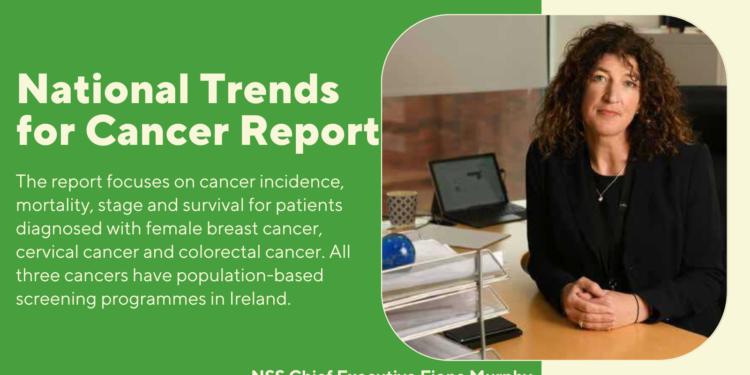The National Cancer Registry (NCRI) has just published a new cancer trends report entitled Breast, cervical and colorectal cancer 1994-2019: National trends for cancers with population-based screening programmes in Ireland. The report focuses on cancer incidence, mortality, stage and survival for patients diagnosed with female breast cancer, cervical cancer and colorectal cancer. All three cancers have population-based screening programmes in Ireland.

National screening programmes organised by the Health Service Executive’s National Screening Service began inviting participants in 2000 (BreastCheck), 2008 (CervicalCheck) and 2012 (BowelScreen). Screening programmes aim to prevent or detect cancers early, therefore ensuring better outcomes for patients.
Key Findings
• All three cancers show favourable trends in incidence, stage, survival and/or mortality consistent with improvements in early detection and outcomes, with clear evidence for additional or more recent benefits of screening.
• Almost a third of cervical cancer cases and a quarter of female breast cancer cases diagnosed during 2017-2019 were detected as a result of screening. A smaller proportion of colorectal cancers were screen detected.
• The introduction of a populationbased screening programme would be expected to decrease incidence in cervical and colorectal cancers, but not breast cancer. The incidence trends seen in our report are consistent with this.
• Screen-detected cancer cases were, on average, detected at a substantially earlier stage than other cases diagnosed at the same ages. Survival has improved for all three cancers, with the biggest improvements in seen in the age-groups targeted by the national screening programmes.
• Death rates of all three cancers have fallen significantly. Decreases in the age-groups targeted for screening have been more substantial than the overall decreases for all three cancers.
Cervical Check
CervicalCheck was introduced in 2008 and now uses HPV testing as the primary screening test to screen women aged between 25-65 years for cervical cancer.
• Overall, the rates of cervical cancer have shown a significant decreasing trend of 2.8% per year since 2009 following the introduction of screening, reversing the previous trend of a significant increase from 1999 to 2009.
• The proportion of cases diagnosed with early-stage cancers (Stage 1 and Stage 2) is much higher in women in the screening age group (88%) than in the non-screening group (52%)
• There has been a significant decreasing trend in mortality by on average 1.1% per year over the 1994-2019 period.
BowelScreen
BowelScreen was introduced in 2012 and offers free at-home screening (FIT test) for bowel cancer men and women aged from 60-69.
• Overall, the rates of colorectal cancer in men have shown a significant downward trend of 2.5% per year following the introduction of screening, with a smaller but still decreasing trend (0.3% per year) in women since 1994.
• The proportion of cases diagnosed with early-stage cancers (Stage 1 and Stage 2) is much higher in screened men (64%) and women (62%) compared to non-screened age groups of men (37%) and women (39%)
• There has been a significant decreasing trend in mortality over the 1994-2019 period and particularly noticeable in the 70+ year male age group (3.7% per year since 2011).
BreastCheck
BreastCheck began screening for breast cancer in the eastern half of the country in 2000 and then extended nationally from 2007. Screening was offered initially every two years to women aged 50 to 64 years, with an extension of the age eligibility to 69 years starting in 2015.
• The trends in incidence show what would be expected following the introduction/ expansion of a screening programme
• The proportion of women in diagnosed with early stage cancers (stage 1 and stage 2) is higher (93%) in women in the screened age group compared to the non-screened age groups of <50 (78%) and > 70 years (75%).
• Mortality rates show a significant decreasing trend (by on average 1.8% per annum).
NCRI Director Professor Deirdre Murray said, “This is the first time that the NCRI has undertaken an in depth analysis on those cancers that have an associated screening programme. Internationally, there is clear evidence that programmatic cancer screening improves cancer outcomes and saves lives. This report demonstrates that the trends in Ireland are consistent with these international findings which is reassuring for service users, providers and policy makers.”
NSS Chief Executive Fiona Murphy welcomed the report and added, “The NCRI report is the first of its kind to analyse the impact of population screening programmes on cancer trends in Ireland. It is agreed that since the 1990s there has been a collective improvement in better awareness of cancer symptoms, new treatments, improvements in care and changes in underlying risks for cancer which have all had a positive impact on improved survival. However, with the publication of this report and the detailed analysis of the various screened populations we can now confidently say that a portion of that improvement is directly attributable to CervicalCheck, BowelScreen and BreastCheck. The public can be reassured that our screening programmes are effective.”
View the November Magazine HERE











